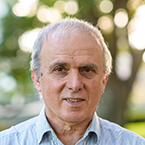
Scientific Areas of Expertise: Cancer Progression; Receptor Tyrosine Kinases; Signal Transduction
For groundbreaking research that revealed the biochemical mechanisms responsible for the development and growth of cancer cells, including the role of growth factor receptors and cellular signaling, and for discovering the function of HER2 as a molecular amplifier of tumorigenesis.
A globally admired trailblazer, Dr. Yarden’s groundbreaking research has revealed the biochemical mechanisms responsible for the development and growth of cancer cells, including the role of growth factor receptors in cellular signaling. Devoted to unraveling the biological roles for hormone-like molecules, Dr. Yarden has pioneered the isolation of several growth factors and their respective receptors. Among his many research achievements, he is credited for discovering the “molecular amplifier” function of HER2, an enzyme and receptor of the epidermal growth factor receptor (EGFR) family often over-expressed in breast, ovarian, and gastric tumors capable of promoting tumor growth. Notably, Dr. Yarden’s work on elucidating the multiple processes of activated receptor-ligand complexes that modulate EGFR signal transduction has identified new therapeutic opportunities based on silencing of molecular amplifiers. As such, his research team has successfully developed numerous antibodies targeting both receptors and cognate ligands of the EGFR-family and established a critical foundation for the development of many anticancer drugs now considered standard of care.
Currently, Dr. Yarden’s work has centered around pharmacological strategies to circumvent therapeutic resistance as well as to resensitize patients to therapeutic treatments. Most recently, his research goals have involved tailoring cancer treatment strategies that involve the combination of chemotherapeutic agents with two or more antibodies. Aiming to achieve synergistic anti-tumor effects, his approaches have consisted of concurrent delivery of several distinct antibodies in which individual antibodies share an antigen molecule (homo-combinations), or distinct, yet complementary antigens (hetero-combinations). Recognized as one of the most influential cancer biologists of his time, Dr. Yarden has made fundamental contributions to the development of modern therapeutic approaches to cancer and has provided invaluable insights into tumor cell biology.
Selected Awards and Honors
2017 Israel Prize in Life Sciences, State of Israel, Jerusalem, Israel
2015 Leoplod Griffuel Award, Fondation ARC pour la Recherche sur le Cancer, Paris, France
2012 Brinker Award for Scientific Distinction in Basic Research, Susan G. Komen for the Cure, Dallas, Texas
2011 President, Federation of Israeli Societies for Experimental Biology, Jerusalem, Israel
2010 Debrecen Award for Molecular Medicine, Faculty of Medicine, University of Debrecen, Debrecen, Hungary
2010 Ernst W. Bertner Memorial Award, MD Anderson Cancer Center, Houston, Texas
2008 Hamilton Fairley Award, European Society of Clinical Oncology, Lugano, Switzerland
2007 Elected Member, Israel Academy of Sciences and Humanities, Jerusalem, Israel
2007 EMET Prize in Biochemistry, Hebrew University of Jerusalem, Jerusalem, Israel
2005 MERIT Award, National Cancer Institute, National Institutes of Health, Bethesda, Maryland
2004 TEVA Founders Prize, Israel Scholarship Education Fund, New York, New York
2000 Michael Bruno Memorial Award, Rothschild Foundation, Aylesbury, United Kingdom
1995 Andre Lewoff Prize, Institut Pasteur, Paris, France
1994 Sergio Lombroso Award in Cancer Research, Weizmann Institute of Science, Rehovot, Israel